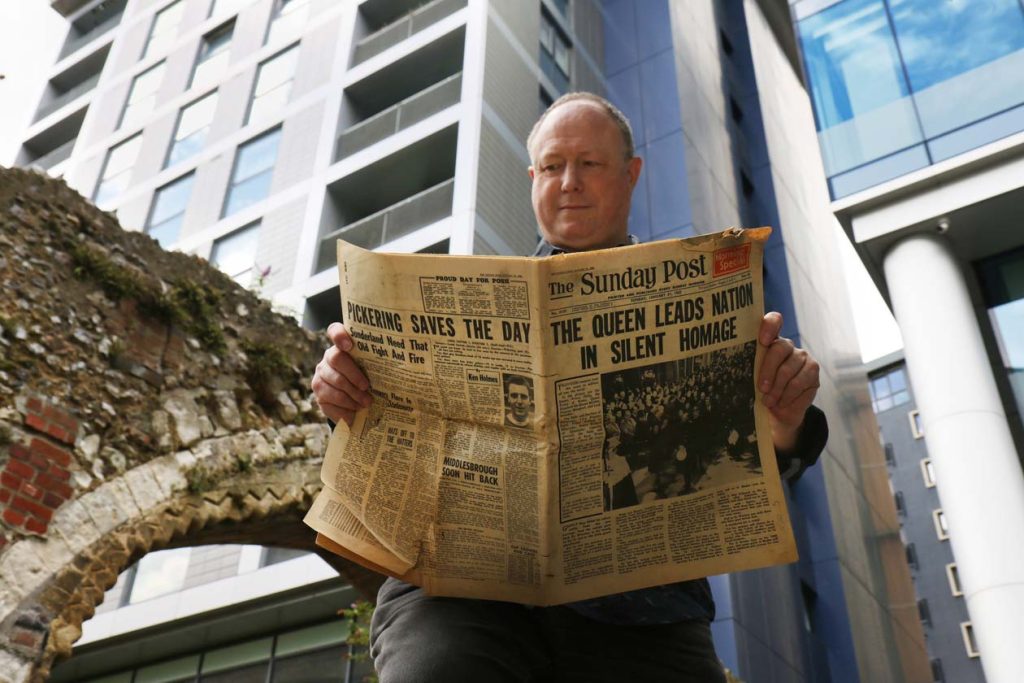From an early age, Phil was making newspapers and magazines, borrowing his dad’s typewriter and scrap paper to do so.
Thankfully these early efforts are long lost to the ravages of time.
Schooldays reading
Born in Canterbury, Kent, in the 1970s, Phil Creighton learnt to read by scanning the ITV variations in The Daily Telegraph before convincing his parents to switch to the Daily Mail because they featured Fred Bassett and Flook.
For A-levels, he redesigned his local freesheet, and spent a day on the subs bench of Today as part of this research, cementing a lifelong love of the newspaper industry.
After secondary school, in a printshop in Folkestone, he worked as a graphic designer for two years, creating logos, leaflets and letterheads. As a result of this experience he has a black belt in photocopying.
Discovering a talent while at the University of Reading
In 1996, Phil went to Reading to read typography and graphic communication, specialising in newspaper design. Part of the course included hand rendering type, something he was terrible at.
Thankfully, he was better at newspaper typography.
For a self-directed project, Phil launched an exhibition showcasing the changes from hot metal to DTP in the newspaper industry, which included a visit to The Lymington Times in the New Forest months before it switched from the clatter of Linotype and lead type grouped in formes.
His dissertation was on the typographical changes made during Piers Morgan’s editorship of the Daily Mirror.
While at university, Phil walked into the offices of the student newspaper Spark and focused on it over and above his studies, editing it for two terms.
Early roles at the Reading Evening Post
Printed at the Reading Evening Post, Phil got to know the pre-press team which led to a freelance job initially setting property adverts just as the 1990s property boom started.
Other pre-press roles included working in the studio and ROP ad setting departments before working in planning: the air traffic control of any publication, setting the size of the papers, dealing with ad reps, plate room and the subs bench.
After graduation, Phil moved into editorial and given the task of editing the new freesheet Reading Central. The popular free weekly was delivered to thousands of homes and given out in key places such as the town’s railway station.
Five years at The Baptist Times
For five years, Phil worked at The Baptist Times, initially as a sub-editor, and latterly as deputy editor and TV critic.
He oversaw two redesigns, the first took the paper from limited colour to full colour, the second added pagination while reducing costs.
During this period and as a result of his TV column, Phil became a pundit on Premier Radio, previewing the weekend’s television. He also wrote a well-received how-to book, advising churches on how to be more effective with their communications including press releases and crisis comms.
And in 2005, he acted as production editor of a daily newspaper for delegates of the Baptist World Centenary Congress held in Birmingham. The multi-lingual 12-page tabloid was printed at Trinity Mirror’s Fort Dunlop site minutes after the evening meeting had ended, with copies distributed via delegates hotels.
Reading Evening Post features editor
He returned to the Reading Evening Post as features editor, devising a weekly leisure magazine, 24Seven. This fused celebrity interviews with theatre previews, what’s on listings, a television guide and food reviews and was well received by the town.
At the time, the Guardian owned the Post and made a round of redundancies, reducing the frequency of the paper from daily to twice weekly and making a host of cutbacks to the detriment of the product.
They latterly sold the papers to Trinity Mirror (now Reach), who made more cutbacks.
With no formal NUJ chapel in place, Phil acted as liaison between management and newsroom during this period.
Ploughing the hyperlocal path
He left in 2012 to launch a hyperlocal magazine for Reading, Wokingham and Bracknell, folding it in 2015 to launch The Wokingham Paper.
This weekly newspaper was created as a response to Trinity Mirror closing the Reading Post and Wokingham Times series, and quickly became the market leader in the borough with a reputation for breaking news, strong political reporting and sticking to the traditions of local newspaper reporting.
It was renamed to Wokingham Today in 2020 to match the name of its website, while a sister paper, Reading Today, was launched in October 2021, also edited by Phil.
Over the years, Phil has been a regular go-to pundit for matters relating to Reading and Wokingham, appearing on Times Radio, BBC Radio 2, BBC local radio, and BBC One South. Not bad for someone who has a face for radio and a voice for print.
Some of the fronts he devised have been shortlisted for Hold The Front Page’s Front Page of the Year contest, winning the accolade in 2023.
He left in June 2024, for freelance opportunities.
Now available for freelancing opportunities
Phil’s new roles include a two-day-a-week PR role for an academic institution based in London and freelancing opportunities. Over the summer of 2024, that includes three days a week freelancing as a news reporter for a local newspaper.
A passionate champion for the hyperlocal sector, Phil has met with government ministers and MPs to talk about the importance of a strong local news industry despite the many pressures the industry faces.
